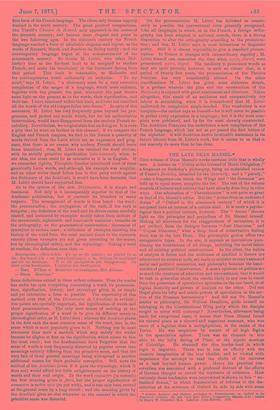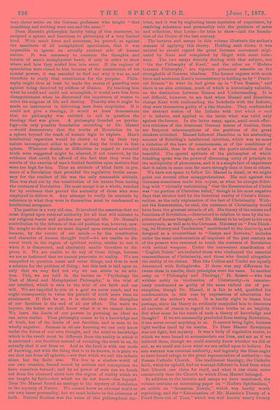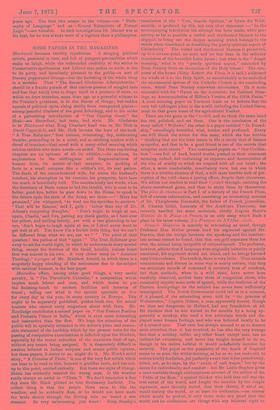THE LATE DEAN MANSEL.*
Tins volume of Dean Mansel's works contains little that is wholly new. A lecture on Utility as the Ground of Moral Obligation ;" a fragment on Berkeley's philosophy, being an unfinished review of Fraser's Berkeley, intended for the Quarterly ; and a " parody," —also a fragment—in which the Whigs and " the Germans" are held up to equal scorn, complete the list. The rest of the volume consists of lectures and reviews that have already done duty in other ways. Our admiration of " Phrontisterion " is not quite so great as that of Dr. Mansel's editor. But the "scenes from an unfinished drama" of "Oxford in the nineteenth century" of which it is composed have an interest of a certain kind. It is more a psycho- logical than a poetical interest, however. The " drama" throws light on the principles and prejudices of Dr. Mansel himself.. Making all allowance for the exaggerations of caricature, it is yet evident, from the dialogue between "Just Discourse" and "Unjust Discourse," what a deep fund of conservative feeling there was in the late Dean. The philosophic genius offers two antagonistic types. In the one, it appears as speculation ques- tioning the foundations of all things, including the social fabric and all existing political constructions. In the other, the habits of analysis it forms and the acuteness of intellect it fosters are subservient to external ends, are made to minister to man's assumed social and political necessities, and philosophy becomes the hand- maiden of practical Conservatism. A man's opinions on politics are so much the creatures of education and circumstance, that it would be rash to generalise about the results likely in any case to result from the possession of speculative aptitudes on the one hand, or of logical dexterity and powers of analysis on the other. Did not. Hegel place his lofty and subtle powers of speculation at the ser- vice of the Prussian bureaucracy ? And did not Dr. Mainers master in philosophy, Sir William Hamilton, pride himself on belonging to the Constitutional Whig party which the disciple sought to cover with contempt? Nevertheless, allowance being made for exceptional cases, it seems that Dean Mansel found his natural place as a shrewd and sagacious reasoner, who was. more of a logician than a metaphysician, in the ranks of the Tories. He was suspicious by nature of all high flighta in the speculative sphere. There was no element in him> akin to the lofty daring of Plato or the mystic musings- of Coleridge. He shunned the dim border-land in which. logic is impotent. There was in him no affinity with the creative imagination of the true idealist, and he viewed with impatience the attempt to read the riddle of the universe as a task beyond human power. Hence his practical con- servatism was associated with a profound distrust of the efforts of German thought to unveil the mysteries of existence. How curiously these tendencies were intertwined is shown in this " un- finished drama," in which denunciation of reforms in the dis- tribution of the revenues of Oxford lie side by side with some • Letters., Lectures, and Reviews, including the Phrontisterion ; or, Oxford fn Me Nineteenth Century. By the Very Rev. Henry Lougueville Monied, D.D.; edited by Henry W. Chandler, M.A. London: John Murray. 1873.
very clever satire on the German professors who taught " that something and nothing were one and the same."
Dean Manses philosophic faculty being of this character, he assigned a sphere and functions to philosophy of a very limited kind. With much force and acuteness, he proved, as against the assailants of all metaphysical speculation, that it was impossible to ignore an actually existent side of human nature. It was necessary to examine the thoughts and intents of man's metaphysical heart, if only in order to show where and how they misled him into error. If the regions of speculation were closed to him because of the constitution of his mental powers, it was essential to find out why it was so, and therefore to study that constitution for the purpose. Philo- sophy might thus at least be made the means of guarding man against being deceived by edifices of illusion. By teaching him what he could and could not accomplish, it would save him from disappointment when he discovered the impotence of reason to solve the enigmas of life and destiny. Thereby also it might be made an instrument in delivering men from scepticism. If it could not give a theology, it would at least demonstrate that no philosophy was entitled to call in question the theology that was given. A philosophy founded on psycho- logy—its only possible foundation according to Dr. Mansel —would demonstrate that the truths of Revelation lie in a sphere beyond the reach of human logic to explore. Man's intellectual capacities would be shown to be by their very nature incompetent either to affirm or deny the truths in that sphere. Whatever doubts or difficulties in regard to revealed truth were suggested might be silenced, if not resolved, by the evidence that could be offered of the fact that they were the results of the exercise of man's limited faculties upon matters that were too high Tor him. Thus an attitude of blind faith in pre- sence of a Revelation that provided the regulative truths neces- sary for the conduct of life was the only reasonable attitude. Man was shut out by the constitution of his nature from testing the contents of Revelation. He must accept it as a whole, vouched for by evidence that proved the authority of those who were employed to deliver it. Any attempt to verify its contents by reference to what they were in themselves must be condemned as intellectual arrogance.
The position is a very old one. It involved the assertion that we must depend upon external authority for all that will minister to our religious wants and quicken our spiritual life. Dr. Mansel's contribution to the defence of this old position was, however, new. He sought to show that we must depend upon external authority, because, by the nature of our minds — by the constitution and character of human thought itself—we are unable to dis- cover truth in the region of spiritual reality, unable to test it when it is discovered, and absolutely unable therefore to dis- prove it. We are unable to do any of these things, because we are so fashioned that we cannot penetrate to reality. We are compelled to question sense and outer things, and thus to seek a solution for the problem of Being ; but this task is laid upon us, only that we may find out why we can attain to no solu- tion. This, we are told in the lecture on "Psychology the Test of Moral and Metaphysical Philosophy," is the trial of our intellect, which is akin to the trial of our faith and our will. We are impelled to aim at a goal we never reach, and we ought consequently to value the pursuit of truth more than its attainment. If that be so, it is obvious that the discipline of our faculties is the end of all our effort. The more we inquire, the better we shall know what it is we cannot know. We learn the limits of our powers in pursuing an ideal we can never realise. Thus philosophy comes to be a knowledge not of truth, but of the limits of our faculties, and is seen to be wholly negative. Because in all our knowing we can only know -under the forms of our own thought, and the relative knowledge which is the result must be different from the reality in which it is exercised ; our faculties instead of revealing the truth to us, do actually shut it out from us. And as the fault is with our mode of knowing, not with the thing that is to be known, it is plain we are shut out from all spheres,—not that which we call the infinite alone, but the finite also. We live in a shadow-world of our own creation, fenced round by notions and conceptions we have ourselves formed ; and by no power of ours can we break out from the charmed circle into the region of reality which we are taught by faith—but which we do not know—lies beyond. Thus Dr. Mansel found an analogy to the mystery of Revelation in the mystery of Nature. We cannot know an external world or our own inner personality, but we must believe in the existence of both. Natural Realism was the name of this philosophical doc- trine, and it was by neglecting these mysteries of experience, by resolving substance and personality into the products of sense and reflection, that Locke—he tries to show—laid the founda- tion of the Deism of the last century.
The lectures and essays in this volume illustrate the author's manner of applying this theory. Holding such views, it was natural he should regard the great German movement origi- nated by Kant and completed by Hegel with scant toler- ance. The two essays directly dealing with that subject, one "On the Philosophy of Kant," and the other on "Modern German Philosophy," are vigorous polemical assaults on the strongholds of German idealism. The former exposes with much force and acuteness Kant's inconsistency in holding on by " Practi- cal Reason" to what he had given up in "Pure Reason," and there is an able criticism, much of which is historically valuable, on the distinction between Reason and Understanding. It is not difficult, however, to see that when Mansel and Hamilton charge Kant with confounding the Indefinite with the Infinite, they were themselves guilty of a like blunder. They confounded the abstract notion of the Infinite with that which is said to be infinite, and applied to the latter what was valid only against the former. In the latter essay, again, amid much effec- tive criticism of the irrational German horror of dualism, there are frequent misconceptions of the positions of the great thinkers criticised. Mansel followed Hamilton in his misleading account of Schelling's intellectual intuition, which was no more a violation of the laws of consciousness, or of the conditions of the thinkable, than is the artist's or the poet's intuition of the beautiful. The special aptitude of the philoaopher of which Schelling spoke was the power of discerning unity of principle in the multiplicity of phenomena, and it is a simple fact of experience that it exists in some men far more strongly than it does in others. We have not space to follow Dr. Maned in detail, or we might point out several other misapprehensions. His zeal against the Germans sometimes made him unjust, as when he charges Schel- ling with " virtually maintaining" that the Resurrection of Christ was "no portion of Christian belief," though in his most negative days that thinker held by the historical reality of Christ's Resur- rection, as the only explanation of the fact of Christianity. With- out the Resurrection, he said, the existence of Christianity would have been the greatest miracle of all. His theory of the nature and functions of Revelation,—determined in relation to man by the im- potence of human thought,—led Dr. Mansel to be unjust to his own countrymen, as well as to the Germans. His essay on " Free Think- ing, its History and Tendencies," contributed to the Quarterly, and designed as a counterblast to "Essays and Reviews," includes under the same condemnation all inquirers of the past century as of the present who ventured to touch the contents of Revelation with critical weapons. Under the convenient classification of "English Deists" are included those who vindicated the essential reasonableness of Christianity, and those who denied altogether the reality of its claims. Men like Collins and Tindal are equally denounced with Bolingbroke. If there was any difference be- tween them in results, their principles were the same. In another essay on " Philosophy and Theology," M. Saisset — who has written nobly in vindication of Christianity—is remorse- lessly condemned as guilty of the same radical sin of pre- sumption, though Dr. Memel, it is fair to add, qualified his condemnation in this case by expressions of admiration for much of the author's work. It is hardly right to blame him perhaps, since his theory so evidently compelled him to denounce all exercise of reason in regard to divine truths as an impiety. But what must be the result of such a theory of knowledge and thought? If we are necessarily precluded from testing Revelation, it can never reveal anything to us. It cannot bring light, because light verifies itself by its results. To Dean Mansel Revelation was not light, but mystery. It was a body of regulative truths, to which we were bound to accommodate our lives, and act as if we believed them, though we could scarcely know whether we did or not, as we could not know what we are called upon to believe. Its sole warrant was external authority, and logically the Dean ought to have found refuge in the great representative of authority—the Roman Catholic Church. The traditional theology, the Catholic faith, which he upheld, had no warrant different in kind from what that Church can claim for itself, and what it can claim more consistently than the Church to which Dean Mansel belonged.
In addition to the lectures and essays we have mentioned, the volume contains an interesting paper on " Modern Spiritualism," an article on "Sensation Novels," which was hardly worth reprinting, and the "Examination of Mr. Maurice's Theory of a Fixed State out of Time," which was well known nearly twenty years ago. The first two essays in the volume—on " Philo- sophy of Language" and on "Recent Extensions of Formal Logic "—are valuable. In such investigations Dr. Mansel was at his best, for he was always more of a logician than a philosopher.




































 Previous page
Previous page